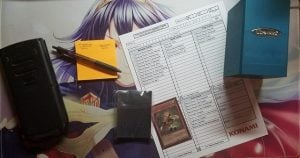Mindset
Before we even touch cards, we must consider a killer of many duelists' records: tilt.
Tilt is when a poor result happens, negatively impacting a duelists' play. To resist the negative feelings of a loss and poor luck, we must examine our own goals and failures.
First, what are our goals as duelists? A natural answer would be "to win duels." This is a result - sometimes outside our control. A goal that is controllable would be to "make the best play you possibly can." This goal is achievable, under your control, and will actively make you a better player. Slowing down and thinking, "I must win this duel" will not. Focusing on the best play will, and results in giving you the greatest chance of winning anyway!
Studying the Meta

While studying the meta, we are trying to decide what deck to play. Sometimes, it may be as simple as playing the best deck. More commonly, a format may have several high tier decks, such as the format at the time of this article's publication (February 2018).
In this format, you could choose SPYRALS, Trickstars, or Pendulum Magicians. We could argue which deck is best, but for the sake of this argument, each deck essentially has the same weakness. And thus, we turn back to the mindset of the duelist - but this time, we focus on other duelists.
For example, in 2011, Billy Brake won YCS Toronto with Plant Synchro, a deck foccused on summoning multiple Synchro and XYZ beatsticks every turn. Billy Brake revolutionized the way duelists thought about main decking "hate" cards by maining two copies of Maxx "C". What happened after was even more incredible - Brake takes a second YCS in a row, with the same deck, with one change: three copies of Maxx "C".
Since Brake's first YCS victory, many players copied his deck. Knowing his own impact allowed him to gain an upper hand in knowledge. But you don't have to win a large tournament to observe trends! Currently, SPYRAL is very popular. It's fine to play SPYRAL, but what will you do to make your mirror match more than a coin flip?
Side Deck
Now that you have your Main deck, you get fifteen cards to obliterate your opponent! There's an article on this website that's about Side Decking (written by a super cool writer), but we'd like to make a further step of preparation. Make a list of cards to side in and side out, going first and second. This breeds confidence, but more importantly it saves time.
Time Awareness and its Importance
In a regional tournament, you have 40 minutes to finish a match. If you run out of time, you have five turns after time is called to finish the duel, otherwise the duelist with higher life points wins.
This is a disruption of normal game flow, as it changes the win condition. This scenario is unfavorable, but even if it results in your victory, I do not condone purposeful slow play. To avoid slow play, I suggest three steps, other than knowing what to side.
- Know your rulings. If an argument arises, you will have to call a judge to explain the circumstances. Being able to explain rulings will save a lot of time.
- Know your win condition. By understanding the conditions under which victory is achieved, you may cut down time thinking.
- Call out slow play. While it may seem unpleasant, some duelists may have unsavory intentions. I wouldn't recommend to count down the seconds to every play. However, having a sense for the complexity of a situation should tell you how long the opponent should think.
Preparation the Day Before

Supplies are paramount when going to large events! Here's a broad list of what to prepare:
- Calculator and written life point notes (If a LP dispute happens, the duelist with written notes will always win).
- Extra Sleeves.
- Pre-Written/Typed deck list (Makes the deck list process so much less stressful - you can find a PDF here).
- Money for food and gas (Specifically! Not for cards!).
- Water.
- Wristwatch (Set for 40 minutes - don't be surprised by time!).
- ...Your deck.
Your aim here is to be as comfortable as possible. Having to worry about where to eat - something else you should look at - or whether you have enough money will stunt your performance. It's nice to have a list, even if it's common sense!
At the Tournament
You're here, congrats! The setup of the tournament will be different depending on your store/venue. But there should be a registration table in an accessible location. Here, you'll get a deck list (if you haven't already) and you'll come back to turn it in.
Usually, the match-ups are placed on a paper on a highly visible wall. More recently, QR codes are used to spread information quickly. Once you have found your numbered seat, wait until the tournament organizer has instructed you to begin. After the match, both players sign a strip of paper placed on the table before the match, and check a box next to the winner.
This process is repeated several times. This will normally take a few hours, so make sure to take breaks to eat and relax, even if it's just a snack!




